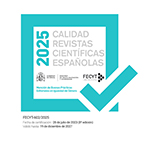Pluralismo y reconocimiento social de los nuevos informativos de RTVE (20062012)
Resumen
Desde el comienzo de sus emisiones en 1956, los contenidos informativos de la televisión pública estuvieron tutelados políticamente. Primero por los órganos de propaganda de la dictadura y más tarde, tras el restablecimiento de la democracia, por el partido gobernante. Durante décadas, la sociedad española asumió con cierta naturalidad, que los informativos de la radiotelevisión pública estaban al servicio del gobierno. Esta perspectiva empezó a cambiar con la reforma y la entrada en vigor de la Ley 17/2006. La principal fuente para la elaboración de este trabajo han sido los estudios realizados entre los años 2006 y 2012 por diferentes empresas especializadas, el CIS, RTVE y los debates de la Comisión de Control Parlamentario, donde queda constancia del apoyo de los ciudadanos a unos contenidos informativos independientes.Descargas
Descarga artículo
Licencia
La revista Estudios sobre el Mensaje Periodístico, para fomentar el intercambio global del conocimiento, facilita el acceso sin restricciones a sus contenidos desde el momento de su publicación en la presente edición electrónica, y por eso es una revista de acceso abierto. Los originales publicados en esta revista son propiedad de la Universidad Complutense de Madrid y es obligatorio citar su procedencia en cualquier reproducción total o parcial. Todos los contenidos se distribuyen bajo una licencia de uso y distribución Creative Commons Reconocimiento 4.0 (CC BY 4.0). Esta circunstancia ha de hacerse constar expresamente de esta forma cuando sea necesario. Puede consultar la versión informativa y el texto legal de la licencia.










